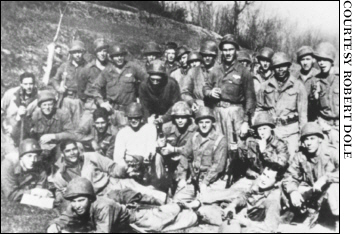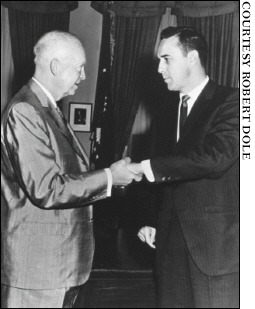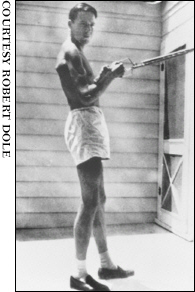Tom Brokaw (36 page)

Bob Dole, platoon leader, 10th Mountain Division, December 1944
(Dole is in the third row, extreme left)
BOB DOLE
“I have a daily reminder of the war because of my disability.
It changed my life.”
T
HE WARTIME EXPLOITS
of Bob Dole are well known by now. He was a young lieutenant out of Kansas when he was gravely wounded as he led his squad from the 10th Mountain Division against a fortified German position in the Italian Alps. He almost died before he was evacuated to the United States for a long series of operations and excruciating therapy in what turned out to be the impossible task of completely saving the use of his right arm. The terrible wound came in a flash of enemy fire on an Italian hillside. The recovery took three years and three months in America, during which he almost died from infections and other complications.
For part of his recovery period he was in a hospital ward with two other wounded veterans, Daniel Inouye of Hawaii and Philip Hart of Michigan. Later the three friends would serve in the U.S. Senate at the same time. Although they represented different political philosophies, that common experience of the war and wounds was a bond that transcended partisan considerations.
Dole still remembers how Hart, whose injuries were not so grave, would leave the hospital to arrange baseball or concert tickets for the men's rare nights out. “We'd talk about who was the worst off, when we were going to get out of that place, but then you'd look around and see someone who really had a problem.”
Dole's experience in the war and the sacrifices of his working-class parents and friends from the small, hardscrabble town of Russell, Kansas, to help him recover from his injuries were appropriately familiar themes in his political career, especially in his campaign for president against Bill Clinton. It was always touching when this complex, proud man, so private and even abrupt when it came to other personal matters, talked about that time in his life, choking up as he described how his father, with so little means, struggled to make the train trip from Kansas to Chicago to see his badly injured son; how his mother, even though she hated smoking, held his cigarettes for him as he lay in a hospital bed, barely able to move either arm in the early going; how the people of Russell set up cigar boxes in businesses along Main Street and labeled them
THE BOB DOLE FUND
, raising eighteen hundred dollars for his medical fees, mostly through quarters and a half-dollars. One of his neighbors was as poor as the Doles, but he wanted to do something, so, the Senator remembers with an affectionate chuckle, “He brought me a duck. Couldn't afford anything else, so he brought me a live duck!”
It may be difficult for current generations to understand just how much poverty there was across America, even after the war. Working-class families lived right on the margins with very little left over. They were used to it, as it had been that way since the beginning of the thirties, especially in rural America. Indeed, after the Depression, joining the Army was a step up for many Americans. Dole remembers, “It was a good deal; you got a good pair of boots, three meals a day, new clothing, a new rifle. It was the most many young Americans had ever had.”
One of Dole's fellow Kansans, Walt Ehlers, who won the Congressional Medal of Honor as a sergeant with the Army's 1st Infantry Division in Normandy, was a poor farm boy when he enlisted, and he still remembers the breakfasts at the Presidio, the Army base in San Francisco. “We had cereals on the table and they had bacon and eggs over easy . . . or whatever you wanted. That lasted for about three months!”
Senator Bob Kerrey, who won a Congressional Medal of Honor in Vietnam, has commented on the old black-and-white photographs of young men lined up for their draft physicals. “About half of them look as if they were malnourished or had rickets,” he said.
James DeVane grew up in rural North Carolina during the Depression. As a combat infantryman, he was captured by the Germans during the Battle of the Bulge and spent three harrowing months in a prisoner-of-war camp. Still, he believes what he and his family went through during the thirties was more difficult and more meaningful to his life. They lived in a simple log cabin, heated by coal and a wood stove, with no plumbing or electricity. DeVane carried a shotgun to school every morning so he could shoot game birds along the way for the kitchen table. His father raised pigs and goats and sold his catch of shad from the Cape Fear River. His mother organized local friends to gather mistletoe from the nearby woods and sell it to New York merchants. Together, DeVane's parents managed to keep the family together, which so impressed their son that he's able to say, “I know it was less stressful to fight as a soldier with only yourself or your squad to look after than it was to care for, feed, and raise children in the Depression.” DeVane, who now has a successful printing business, concludes, “We World War II infantrymen came from a background of heroes.”

Bob Dole:
1961 freshman term

Bob Dole:
rehabilitation, 1946
Bob Dole wouldn't argue with that. Although he has been gone from the neighborhoods and the economic constraints of Russell, Kansas, for a long time now, those early experiences still shape his attitudes. In his richly appointed office in Washington, D.C., he keeps a picture of his father dressed in his Key-brand overalls, explaining that that's what his dad wore to work every day. For all of his power, celebrity, and prosperity, in his emotional makeup Dole isn't that far removed from his Great Plains roots and formative experiences.
The financial deprivations of his childhood, however, were not enough to prepare him for the terrible price he paid in the war. Dole admits he was bitter at times, that he felt sorry for himself. Even now he occasionally goes back over the fateful day he was hit.
The assault had been delayed for a day because of the death of Franklin Roosevelt, the beloved president and commander in chief. Dole was greatly saddened by Roosevelt's passing, but he sometimes wonders, “What if he hadn't died
that
day? What if we had moved out on schedule? Would I have been wounded?”
After the war, when he fully understood that he would never be completely the same again, that he couldn't turn back the clock, he decided to make up for lost time. By his own admission, he hadn't been much of a student before the war. He had been a good-time fraternity boy at the University of Kansas. But his life had since been changed forever. He'd spent five years either in uniform or in hospitals, and as soon as he was able, he took advantage of the GI Bill and headed for the University of Arizona law school. There, the government provided him with a left-handed typewriter, a recording machine so he could take notes, and a car with a left-handed gearshift. As he says now, fifty years later and having spent an adult lifetime in politics, “Talk about a generous government.”
It did not, however, make Dole a champion of government-spending programs for other needs that were more social in character. He says the lesson of the GI Bill was that it provided self-reliance.
Dole was not particularly ideological when he was asked by both the Democrats and Republicans in his home county to run for Congress. He was pragmatic, however, figuring the Republicans gave him the best chance of success, so that's where he wound up. He went from the U.S. House of Representatives to the U.S. Senate in 1969.
In his maiden speech in the Senate on April 14, 1969, Dole appealed for a presidential commission on people with disabilities. He described the disabled as a group no one joins by personal choice, saying “the requirements for membership are not based on age, sex, wealth, education, skin color . . . political party, power, or prestige. . . . It's an exceptional group I joined on another April 14: 1945.”
It was the beginning of his personal crusade to make life easier for the more than forty million disabled Americans. By 1990 he had moved Congress to pass the Americans with Disabilities Act, a sweeping piece of legislation that mandated changes in public buildings, accommodations, and transportation to make it easier for the disabled to function in American society.
For Dole, it was his greatest legislative victory. Yet it was also a classic example of the two sides of Bob Dole. Although he was a champion of this federal directive that imposed on states and businesses rigid requirements that were costly and, in some cases, little used, he was also known for advocating a reduced role for the federal government.
On some issues Dole was much more single-minded. The Vietnam War was the most taxing time for him. He hated the flag-burning, noisy protests, the in-your-face lectures from long-haired students protected from the draft by deferments or influence. As chairman of the Republican National Committee under President Nixon, Dole made some very harsh speeches, all but accusing antiwar protesters and the news media of treason.
As President Gerald Ford's running mate in 1976, Dole's intolerant side would show through. In a famous moment, during a debate with his vice-presidential opponent, Walter Mondale, Dole blamed the Democrats for World War II. Later, in 1988, when he lost the New Hampshire primary to George Bush in the race for the Republican presidential nomination, I had both candidates on the air simultaneously. Bush, flush with victory, said he looked forward to seeing Dole at the next stop on the campaign trail. When I asked Dole if he had anything he wanted to say to Bush in return, Dole snarled, “Yeah, tell him to stop lying about my record.” It was a self-wounding act for Dole, and even he seemed to know it.
He's much more mellow now, content to be an elder statesman. But looking back on his political career, he cannot forget those days when antiwar protestors would come to his office or show up at his speeches. This man who endured so much personal pain and whose life was so altered by his time in uniform can now recall thinking during those confrontations, Why am I sitting here all banged up for this ragtag operation? Is this what America is all about? Then, answering his own question, he says in that cryptic Dole style, “I guess that's what it is all aboutâfreedom. But sometimes it's a stretch. I remember being glad when they were gone. Besides, kids are better now.”
As a product of his time and a proud but private man, Dole was an anchronistic candidate for president in the last election before the turn of a new century. He seemed to be playing by old rules and values as he made his way across the country, raising questions about Bill Clinton's facile form of governing by asking, “Where's the outrage?” He invoked his World War II experience and the lessons of his wounds repeatedly, but they were lessons lost on a new generation of voters who were barely aware of Vietnam.
The earlier flashes of dark rage that characterized his initial years on the national stage were gone, but the sharp humor, one of Dole's most endearing characteristics, remained. It was Dole who once remarked that America had three living ex-presidents, “Jimmy Carter, Gerald Ford, and Richard Nixon.” Without missing a beat, he went on, “Speak No Evil, Hear No Evilâand Evil.” But as a man who wanted the presidency for himself, he simply could not win the hearts and minds of enough American voters.
In his campaign, however, there were moments that gave him a lift. He'd be on a stage somewhere, preparing to give another speech, another stop in a long campaign that simply could not get traction. He'd look out into the audience and lock eyes with a white-haired man or a group of them in their American Legion or Veterans of Foreign Wars caps, sometimes in windbreakers with their military units spelled out. They would nod quietly to one another, the candidate and the men of his generation who had been to war and back. It was a silent ritual played out hundreds of times across America, a valedictory salute between a generation and one of its own.
Bob Dole, the man from Russell, Kansas, who grew up in the basement of his family home so that his parents could rent out the upstairs, is now a prosperous elder statesman in Washington, often cited as a prospective intermediary in vexing political problems. He's undertaken special presidential missions to Bosnia and Kosovo.

